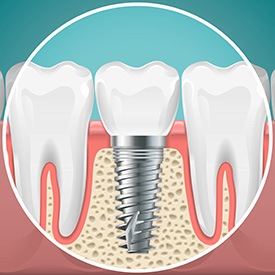
Dental Implants — Wheaton, IL
Say Goodbye to Tooth Loss for Good
Dental implants are a complete game changer in the field of dentistry. Previously, dentists were only able to approximate real teeth when replacing them, but the treatments still left a lot to be desired. Dental implants, however, offer the next best thing to nature, providing a strong and natural-looking result that can also be trusted to last for decades. If you’re tired of dealing with missing teeth, you can now get this state-of-the-art solution right here in Wheaton with Dr. Lam . To learn more and see if you’re a good candidate for this treatment, contact us today .
Why Choose Dr. Kathy Lam For Dental Implants?
- #1 Partnered with Trusted Local Specialists
- #2 Able to Permanently Replace Any Number of Missing Teeth
- #3 High-Quality Materials for Natural & Long-Lasting Results
Why Replace Missing Teeth?

Whether you’re missing one pearly white or an entire arch, leaving that empty gap in your mouth can have serious consequences for your oral health. Not only will you feel insecure from your incomplete smile, but you may also struggle to chew many foods. This can cause limitations in your diet, which can lead to nutritional deficiencies.
There are also serious complications brewing beneath the surface of your gum tissue. Your jawbone is slowly deteriorating because it’s no longer stimulated by the tooth root. This causes your surrounding teeth to lose support. Over time, they shift out of position, increasing your risk of tooth decay and gum disease. As more time passes, they may even become loose and fall out.
The more bone you lose, the more your facial appearance will change as well. Your tissues and muscles lose support, which can cause premature wrinkling and sagging skin. Leaving your missing teeth untreated can make you appear years older than your true age.
Fortunately, there is hope with dental implants! A dental implant is the only treatment to replace the entire structure of the tooth, including the root.
What Are Dental Implants?

Dental implants in Wheaton are the most predictable and reliable option to treat one or more missing teeth. Unlike other prosthetics, dental implants are the only treatment to replace the entire structure of a tooth.
The dental implant itself is a small titanium post. This post can be anchored directly into the jawbone, just like the roots of a natural tooth. Titanium is a biocompatible material, so the bone tissue with strengthen and grown around the implant to provide security. Then, a crown, bridge, or denture can be supported by one or more dental implant to complete your smile.
Not only does this allow them to closely mimic your natural teeth, but it also gives you a solution that can last for a lifetime. Their long-term success relies on a multi-phased treatment process. Although it may take longer to complete your smile than when choosing a traditional option, it is time well spent.
The 4 Step Dental Implant Process

The placement of dental implants into the jawbone is a very complicated and sensitive procedure, which is why we refer our patients to one of our partner oral surgeons to perform the surgical part of the treatment. Every one of our specialists has received years of advanced training, and each of them has literally placed thousands of implants over the course of their careers. Thanks to their expertise, we can make sure that when we restore a patient’s implants, we can guarantee that their new teeth are going to last a lifetime. Read on to learn more about the four main steps in getting dental implants.
Initial Dental Implant Consultation

Your first step to rebuilding your smile is to schedule a consultation with your dentist in Wheaton, Dr. Lam. Besides performing a visual examination, digital X-rays and a CT scan are needed to assess your oral health and structures. This allows Dr. Lam to see below the surface to ensure there are not any issues that can compromise the long-term success of your new smile, like an infection.
Depending on the results of the examination, Dr. Lam may recommend you have additional treatments before having your implant placement surgery, such as bone grafting, a sinus lift, or tooth extractions.
Dental Implant Surgery

After the foundation is created for your new smile, the CT scan is used along with computer-guided technology to pinpoint the ideal location for the posts. Sedation or anesthesia is used to ensure your comfort as your gum tissue is opened to give access to your jawbone. A small hole is made for each post to be inserted. Your gum tissue is sutured closed, and you will spend the next several weeks healing.
Dental Implant Osseointegration & Abutment Placement

The implant posts serve as new tooth roots, which stimulate your jaw to encourage new bone growth. This allows your jawbone to fuse to the posts over the next several weeks. This process is called osteointegration, and it is vital to the long-term success of your new smile.
After your jawbone has healed, there will be a stable foundation to attach your restorations. Before your restorations are attached, you need a second minor surgery to place special fixtures on each post. The abutments act as a connector piece between the restorations and the implant posts.
Delivery of Dental Implant Restorations

The final step of your journey involves the restorations. Dr. Lam uses advanced technology to take an impression of your mouth. Your restorations are carefully crafted to meet your exact needs using the impression. They are made from high-quality material to ensure the best strength to mimic your natural functions. They are also designed to match the appearance of your teeth for natural-looking results.
Benefits of Dental Implants

Did you know that an estimated 500,00 people have dental implants placed annually? They continue to gain popularity because they’re the only replacement teeth directly placed into your jawbone. As a result, they tend to be stronger and more resilient and offer unique advantages over alternatives like dental bridges or dentures.
If you’re considering dental implants but aren’t sure how they can help you, continue reading below to learn about some of their benefits. For additional information, feel free to contact us and we’d be happy to assist you.
Day-to-Day Benefits

Tooth loss can detract from your daily quality of life because gaps in your grin make it harder to perform basic tasks. Things that once were second nature, such as smiling, speaking, and eating, became much more challenging. Replacing missing teeth with dental implants can enhance your day-to-day world because they:
- Restore up to 90% of your natural chewing power, so you can enjoy all your favorite meals without worrying about them being dislodged.
- Boost your confidence by refurbishing your grin with a replacement tooth that looks and feels like the one you lost.
- Easily clean them by brushing and flossing twice daily without having to remove them or use specially designed supplies.
- Avoid the potential embarrassment of having your restoration fall out of your mouth mid-meal or conversation like you might with dentures or dental bridges.
Health Benefits

There are additional advantages to having dental implants that are less obviously noticeable but just as important, including:
- Maintain your facial structure. When you lose adult teeth, your body resorbs bone mass from your jaw that’s not needed to support them. This can cause sunken and sagging cheeks and other changes to your visage. Dental implants stimulate your jawbone every time you bite down so it stays active and healthy.
- Prevent sores. Dentures rely on forming a firm suction against the ridges of your mouth to remain in place, which can rub raw spots in your gum tissue that can become painfully infected. Meanwhile, dental implants function as sturdy stand-alone structures.
- Enhance your health. They’re easier to maintain than the other options so you’re less likely to develop cavities or gum disease. Periodontitis can enter the bloodstream if left untreated and cause additional issues like heart problems or diabetes, which means these replacement teeth also contribute to your overall condition.
Long-Term Benefits

Thankfully, dental implants are incredibly resilient and can resist damage so you can continue to make the most of them over time. They provide several long-term benefits that you might not be aware of, such as:
- High success. These artificial teeth have up to a 95% success rate even as long as 10 years after their initial placement.
- Save money. They tend to be pricier than the alternatives initially but require fewer repairs or replacements, so they can be more cost-effective in the long run.
- Dental implants have been known to last 30+ years with the right care, which might be the remainder of your natural life!
Who Dental Implants Can Help

If you are an adult with at least one missing tooth, you likely make an excellent candidate for dental implants in Wheaton! Factors that contribute to the success of the procedure include whether the patient:
- Maintains excellent oral hygiene habits
- Has healthy gums
- Has a strong and thick jawbone
To find out more about dental implants and learn whether the procedure is right for you, schedule an initial consultation with Dr. Lam today.
Who Is a Good Candidate for Dental Implants?

Whether you’re missing one, two, or even several teeth, dental implants are still a viable option for you. Dr. Lam can help you decide which of the following restorations is best for your particular situation:
Missing 1 Tooth

To fill in a lone gap in a smile, an implant root can be placed into the jaw and topped with a dental crown. Because of the strength of the implant, the teeth around it won’t need to be shaved down to make room or provide support, better preserving someone’s natural smile.
Missing Multiple Teeth

Positioning just two implants on either side of the gap in a patient’s smile enables us to place an implant bridge. It can bring back three or more missing teeth in a row, and it’s much more cost-effective than restoring each tooth individually.
Missing All Teeth

And, for a patient who has lost an entire arch of teeth (or who plans to have all their remaining teeth along an arch extracted), Dr. Lam can bring their smile back with an implant denture using the All-on-4. These involve using only four implants to support a full arch bridge, instead of replacing each tooth with an individual implant that would be prohibitively expensive and unnecessary.
Understanding the Cost of Dental Implants

Dental implants are a highly versatile procedure, and as a result, their cost can vary quite a bit from person to person. Someone who needs a single implant is probably going to pay less than someone who requires four, and because of aesthetic concerns, replacing the front teeth usually costs more than the back. The only way to really know what your implants will cost is simply for you to come see us for a consultation. Beware of anyone who offers a flat-rate for implants—they are likely not of the highest quality!
Dental implants should be considered a long-term investment in your oral health. They might be more expensive than traditional bridges and dentures, but they provide better function and last much, much longer as well. Over the course of someone’s life, they’ll likely need to replace a bridge or denture multiple times, but implant patients often have the same restorations for decades at a time. In the long run, a patient will spend much less on implants because they don’t require as much maintenance or retreatment.
Cost of Preliminary Procedures

Not all patients seeking dental implants will need pre-implant procedures. If you do not, you can expect your costs to be lower than someone needing a bone graft, sinus lift, or even ridge augmentation.
Are Dental Implants Worth the Investment?

Without a doubt, dental implants offer patients much more than their traditional counterparts. One of the most obvious reasons patients choose dental implants is because of their longevity and permanence. Unlike a fixed bridge or dentures, dental implants are surgically placed into your jawbone, offering greater stability while mimicking the natural tooth structure. Plus, they continue to stimulate your jawbone, allowing you to maintain your facial shape and structure for a more youthful appearance.
Does My Dental Insurance Cover Dental Implants?

When choosing dental implants to replace your missing teeth, you’ll need to know how to pay for the cost of your services. Some dental insurance companies do not cover the placement of dental implants, but they may be able to pay for your initial consultation, metal abutment, and finalized restoration if a claim is filed.
If you are having difficulty paying the remaining balance or you are uninsured, your dentist in Wheaton can help you enroll in a financing plan that will allow you to stay within budget while working toward a new smile.
Dental Implant Salvage

Dental implant failure is extremely rare – in fact, dental implants enjoy a very high success rate of 98%! However, let’s look at the rare cases in which dental implants can fail and why they are not successful.
Osseointegration, the natural process in which an implant fuses with the jawbone, can be negatively impacted or even prevented by:
- Tobacco use
- Low bone density
- Diabetes
When osseointegration fails, the dental implant cannot provide the stable base necessary for an artificial crown or bridge, and the implant will fail.
Oral infections such as gum disease can also diminish the chances that an implant will heal properly. That is why it is critically important that patients who wish to replace missing teeth must practice excellent oral hygiene both before and after getting dental implants.
Maintaining & Caring for Dental Implants

Dental implants are the best tooth replacement option out there. Since they replace the roots of the missing teeth, they allow for a wide range of additional benefits that you can’t achieve with dental bridges or dentures. Once of greatest benefits of dental implants is that they have a success rate of over 95%. The being said, to see this success, it is important that you maintain and care for your implants properly. Read on to learn more about how you can keep your implants in good condition.
Make Oral Hygiene a Priority

Dental implants don’t get cavities like natural teeth because they aren’t made from tooth enamel. However, your surrounding natural teeth are still at risk, and there is still a possibility of developing gum disease. Gum disease would be detrimental to the success of your replacement teeth, so it’s important that you maintain excellent oral hygiene routine. Remember to brush twice, floss, and rinse with mouthwash every day.
Eat a Healthy Diet

One of the exciting benefits of dental implants is that you can enjoy a complete, nutritious diet. You don’t need to keep up with any eating restrictions. However, you should still do your best to avoid having too many food items that are sugary or tough. Instead, eat plenty of foods that are high in calcium and vitamin C. These nutrients are necessary to make your jaw and gums healthy.
Break Bad Habits

Bad habits can cause a variety of issues for teeth and dental implants if you aren’t careful. It’s best to refrain from using tobacco products – especially as you are recovering from your procedure. Smoking also slows down the healing process, making it more difficult for your body to fight off infections. You should also avoid using your teeth to open bottles, rip through packaging, and complete other tasks. Instead, find the appropriate tool so you don’t cause damage to your smile.
Protect Your Dental Implants

Dental implants are very strong, but they aren’t completely indestructible. You should always wear a mouthguard while engaging in contract sports. If you grind your teeth at night, you should ask your dentist about wearing a nightguard to protect your teeth from further wear and tear.
Schedule Regular Dental Checkups

You should continue to see your dentist for routine cleanings and checkups twice a year. This way, we can monitor your dental implants, natural teeth, gum tissue, complete an oral cancer screening, and more. By detecting issues early on, we are more likely to be able to address them quickly, preventing serious complications in the future.
Dental Implant FAQs

Are you considering joining the thousands of Americans who get dental implants each year but still have questions about the procedure? You have come to the right place. Dr. Lam has compiled some of the most common questions – and answers – about dental implants in Wheaton. Take the time to read through this dental implant FAQ section. Then, if you still want to know more – or if you are ready to schedule an initial consultation with Dr. Lam – do not hesitate to give us a call!
Does It Hurt To Get Dental Implants?
Some patients worry that replacing their missing teeth with dental implants will be an extremely painful experience. In fact, there is no reason for concern! Dental implants are typically placed under a local anesthetic that numbs the mouth and prevents feelings of pain.
For more complex, lengthier cases that involve multiple implants, sedation can be provided to make patients feel relaxed and at ease during the surgical procedure. Sedation can also be used to help those patients that suffer from severe dental anxiety.
We partner with trusted local specialists who will ensure you are as comfortable and relaxed as possible while your dental implants are being placed.
How Long Do Dental Implants Last?
Dental implants are a long-lasting solution to filling in the gaps in your smile! With proper care, you can count on your new artificial teeth to remain in place for two decades – or even the rest of your life!
How long dental implants last is influenced by a variety of factors, such as:
- If you lead an overall healthy lifestyle.
- If you brush twice a day and floss daily.
- If you avoid chewing on very hard items, like pen caps.
- If you see a dentist in Wheaton every six months.